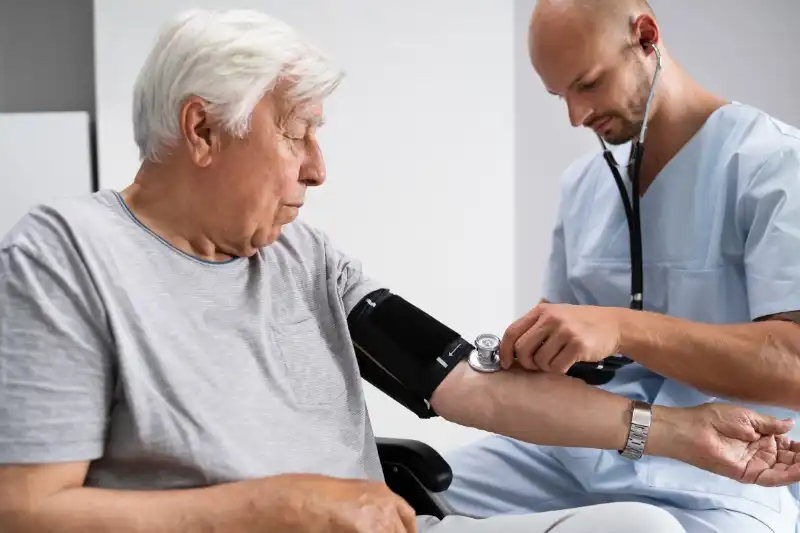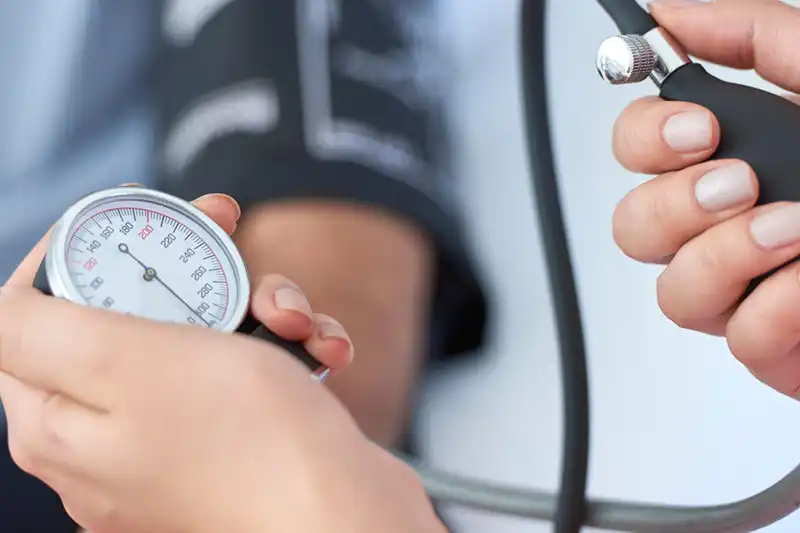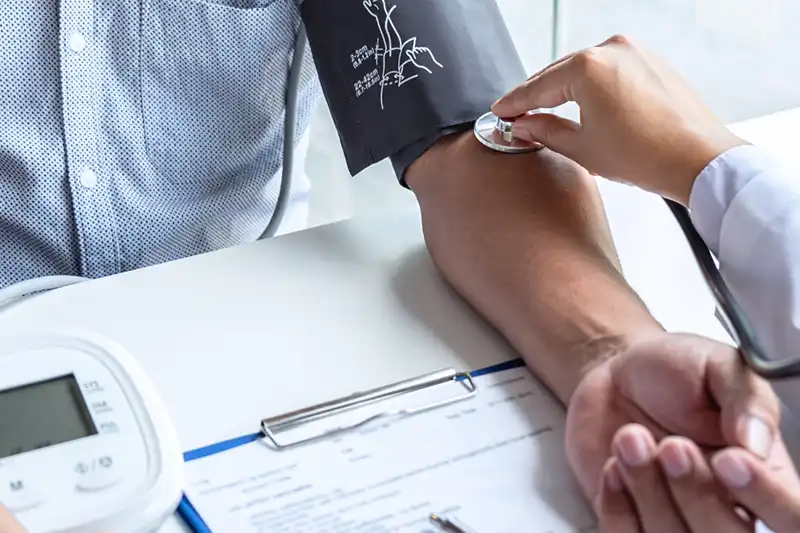Emergency Room for Hypertension (High Blood Pressure) Care
Hypertension can be a medical emergency. Get cardiac care without the wait – no appointment needed.
At Surepoint Emergency Centers, we recognize the urgency of hypertension. Our skilled team of emergency physicians and nurses are available 24/7, equipped to address high blood pressure issues with prompt, expert care. Whether you’re facing symptoms like severe headaches, vision problems, chest pain, or shortness of breath, our advanced tools and dedicated professionals prioritize your health in critical situations, ensuring immediate attention when you need it most.

What is Hypertension (High Blood Pressure)?
Hypertension, or high blood pressure, occurs when small arteries (arterioles) narrow, making it harder for blood to flow. This strains the heart and increases blood vessel pressure. Shockingly, over 80 million Americans have high blood pressure, with 16 million unaware of their condition. If left untreated, hypertension can lead to serious issues like heart attacks or strokes. Recognizing hypertension symptoms early and seeking immediate care is crucial—it can make a significant difference. If you suspect a heart attack, don’t hesitate to call 911 or head to your nearest Surepoint ER, specializing in hypertension and heart health, for prompt and expert assistance.
Surepoint is Open 24/7 Near You!
If you think you are having a cardiac emergency, please visit the ER nearest you. We are open 24-7, no appointment needed.
What Are the Signs of Hypertension?
Hypertension, also known as high blood pressure, is often called the “silent killer” because it doesn’t typically show noticeable symptoms. However, some individuals might experience shortness of breath, occasional headaches, or nosebleeds. In more severe cases, patients could complain of symptoms like nausea, vomiting, confusion, and changes in vision. These signs usually emerge when hypertension has reached a critical and life-threatening level. Early detection and proper management are crucial to prevent complications. Common symptoms and signs of hypertension include:
- Headaches: Especially in the morning.
- Shortness of Breath: Especially during physical activity.
- Nosebleeds: Unexplained or frequent nosebleeds.
- Dizziness or lightheadedness: Feeling dizzy or fainting.
- Blurred or Impaired Vision: Vision problems can occur in severe cases.
- Chest Pain: Often associated with hypertensive crisis.
- Ringing in the ears: Potentially causing or worsening tinnitus
What Causes Hypertension?

Hypertension, or high blood pressure, doesn’t have one clear cause. Its origins are often uncertain, but certain factors increase the risk. Hypertension can be essential (unknown cause) or secondary (due to specific issues). About 90-95% of adults have primary hypertension, lacking a known cause. Secondary hypertension stems from conditions like kidney problems. Proper treatment involves addressing these issues, reducing blood pressure, and lowering the risk of severe complications like heart disease and stroke. Common causes of hypertension include:
- Genetics: Family history of hypertension increases the risk.
Unhealthy Lifestyle: Poor diet, lack of exercise, and excess weight.
High Salt Intake: Consuming too much sodium can raise blood pressure. - Alcohol Consumption: Excessive drinking can lead to hypertension.
- Stress: Chronic stress and high levels of anxiety can contribute.
- Smoking: Tobacco use damages blood vessels, increasing pressure.
- Chronic Kidney Disease: Impaired kidney function can result in hypertension.
- Sleep Apnea: Interrupted breathing during sleep can raise blood pressure.
- Hormonal Disorders: Conditions like thyroid disorders or adrenal gland tumors.
- Medications: Some medications, including birth control pills, can elevate blood pressure.
- Age: Blood vessels become less flexible with age, increasing susceptibility.
- Gender: Men are generally more prone to hypertension, while women become at higher risk after menopause.
When Should I Go To The ER For Hypertension?
Hypertension is a serious health concern, significantly increasing the risk of heart disease and stroke, which are the leading causes of death in the United States. Despite being common, many adults have uncontrolled high blood pressure because its symptoms are rare. To effectively manage it, regular blood pressure monitoring and awareness of new symptoms are crucial. Normal blood pressure is 120/70 mmHg; readings above this indicate hypertension. In a hypertensive crisis, high pressure can damage blood vessels, leading to blood clots and organ damage. In the ER, doctors use medications to lower blood pressure, assess organ damage, and treat complications. Even without obvious symptoms, high blood pressure requires immediate attention. Always prioritize your health. If you’re worried about a hypertensive crisis, trust your instincts – don’t hesitate to visit a Surepoint ER or call 911 immediately.
Hypertension Diagnosis and Treatment at Surepoint ER

To diagnose hypertension, visit a Surepoint Emergency Center for a blood pressure measurement using a cuff (sphygmomanometer). The cuff is placed around your upper arm, inflated, and then slowly released. The reading comprises two numbers: systolic (top) measures pressure during heartbeats, and diastolic (bottom) measures pressure between beats. Normal blood pressure is below 120/80 mm Hg for most adults. High blood pressure is consistent with systolic readings of 130 mm Hg or higher or diastolic readings of 80 mm Hg or higher. If diagnosed, your doctor may recommend home monitoring and lifestyle changes or medications to lower your blood pressure. Common hypertension treatments include:
Lifestyle Changes:
- Choose heart-healthy foods like the DASH eating plan, combined with a low-salt diet.
- Limit alcohol intake and seek support from resources like the Alcohol Treatment Navigator.
- Engage in regular physical activity to lower and control high blood pressure levels.
- Aim for a healthy weight; even a 3-5% weight loss can improve blood pressure.
- Quit smoking.
- Manage stress through relaxation techniques, counseling, or support groups.
- Ensure 7-9 hours of good-quality sleep; establish regular sleep routines and a calming bedtime routine.
Medications:
- Angiotensin-converting enzyme (ACE) Inhibitors: Prevent blood vessel narrowing.
- Angiotensin II Receptor Blockers (ARBs): Maintain blood vessel openness.
- Calcium Channel Blockers: Relax blood vessels by preventing calcium entry.
- Diuretics (Thiazides): Remove excess water and salt from the body, reducing blood volume.
- Beta Blockers: Slow heart rate and reduce blood volume; used in specific cases.
Taking prescribed medications and embracing a heart-healthy lifestyle are vital steps in controlling high blood pressure and preventing heart disease. Early detection through regular check-ups is crucial, allowing timely intervention. By consistently monitoring your health and making healthy choices, you significantly reduce the risks associated with hypertension and enhance your overall well-being. Take the first step towards a healthier you by visiting a Surepoint ER today for your blood pressure test.
Our Tips For Preventing Hypertension at Surepoint ER
Regardless of your age, daily steps can maintain healthy blood pressure and reduce the risk of heart disease and stroke. Known as hypertension, high blood pressure can often be prevented or managed through a healthy lifestyle. This includes maintaining a balanced diet, a healthy weight, regular exercise, moderate alcohol consumption, and not smoking. Common hypertension prevention tips at Surepoint ER include:
- Eating a Healthy Diet
- Regular Exercise
- Maintaining a Healthy Weight
- Limiting Alcohol
- Not Smoking
- Managing Stress
Be Proactive About Your Health: Hypertension Symptoms Matter
Don’t take chances with your health, especially when it comes to hypertension. If you’re facing symptoms like chest pain or shortness of breath, our emergency centers are open 24/7, ready to help. Click below to locate a Surepoint ER near you for prompt diagnosis and care. Your well-being matters.





